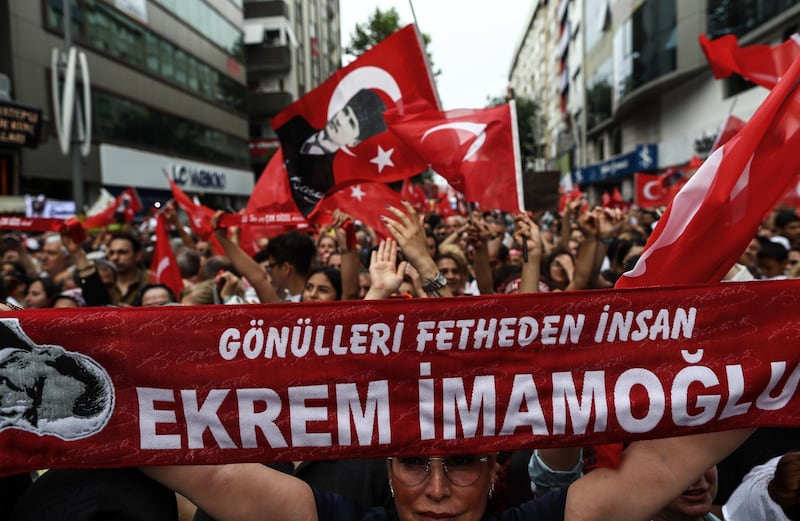Istanbul is the heart of Turkey; it is Turkey's economic engine. It boasts 18 per cent of the country's population but accounts for 32 per cent of the country's GDP. Yet numbers alone cannot simply explain the city's importance to the Turkish psyche; it was, after all, the seat of the Ottoman Empire and continues to this day to have a magical hold on the Turkey’s collective imagination. More importantly, Istanbul is a microcosm of the country as a whole, as its population is composed of residents from all four corners of Turkey, with strong political and social attachments to their provinces of origin.
On Sunday Istanbulites will go to the polls for the second time in three months to determine who will be the city's mayor. The re-run of the March 31 mayoral election comes after opposition candidate Ekrem Imamoglu, of the Republican People's Party (CHP), was previously declared winner, ending a 25-year grip on Turkey's most populous city by president Recep Tayyip Erdogan's party and its Islamist predecessor. The result was contested after local elections saw major gains by opposition parties across the country, including the capital Ankara being taken by the CHP, among many other notable municipalities. In Istanbul, the CHP eclipsed the president's party by a margin of about 13,000 votes.
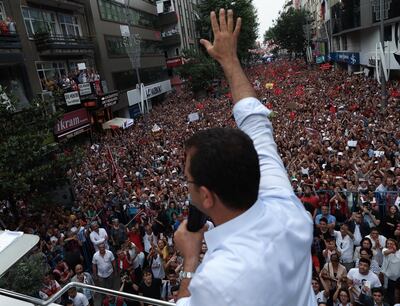
The defeat of Binali Yildirim stunned Mr Erdogan and his ruling Justice and Development Party (AKP). An AKP stalwart and Erdogan confidant, Mr Yildirim, who had served as a former speaker of parliament, prime minister and transportation minister, was bested by a newcomer, the mayor of one of Istanbul's distant sub-districts, Beylikduzu.
This was a double blow to the AKP as Mr Erdogan had himself won Istanbul's mayoral race in 1994 with a relative rather than an outright majority. Ever since, Istanbul has been an AKP – or to be more precise, an Erdogan – fiefdom. Indeed, it was Mr Erdogan's tenure as mayor that ultimately propelled him to his current position.
There is another reason why Istanbul is critical to Mr Erdogan and the AKP. As the president consolidated his hold on power, Turkey’s richest city was transformed into a cash cow for his party. Mr Erdogan conceived of, and initiated, massive infrastructural projects, ranging from bridges to highways and the world’s largest airport. These endeavours benefited a select group within the Turkish business community, including friends and family members. With no oversight of expenditure, the city budget was even used to subsidise and support a variety of endeavours, including an archery club on whose board Bilal Erdogan, the president’s son, sits. Another beneficiary is Turgev, an NGO founded during Mr Erdogan’s days as mayor, whose goal is to support educational efforts, largely by providing residence halls. Esra Albayrak, his daughter and wife of the economy minister, sits on its board.
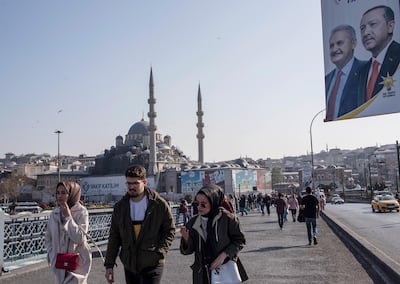
Istanbul is a complex city. Mr Erdogan has enjoyed a great deal of support there but, outside Kurdish areas in the east and southeast, it is also home to potentially the greatest source of opposition to the regime. In fact, Mr Erdogan is still haunted by the Gezi protests of May 2013, when the city was shaken by some of the largest demonstrations seen in contemporary Turkey. To this day, the president claims the protests were a coup attempt and has assiduously continued the persecution of anyone remotely associated with those events. So it should come as no surprise that Mr Erdogan once reportedly said: “If we lose Istanbul, we lose Turkey."
Yet despite Istanbul’s significance, Mr Erdogan and the AKP initially assumed a lackadaisical attitude in the run-up to the March 31 municipal contest. Mr Yildirim, a self-effacing candidate, took his time to resign as parliamentary speaker and commence campaigning. Clearly Mr Erdogan and the AKP underestimated their opponent but they were also victims of their own groupthink. With more than 90 per cent of newspapers and media outlets controlled by his cronies, and given that he has purged his entourage of all those who founded the party with him, replacing them with loyalists and sycophants, Mr Erdogan was clearly misinformed of developments on the ground. Mr Imamoglu turned out to be a much better campaigner than expected; he remained unfazed by all the accusations thrown at him by the Erdogan press and focused on local concerns and issues. Mr Yildirim, by contrast, projected an image of someone who had been parachuted in as a candidate going through the motions for a contest with a predetermined outcome.
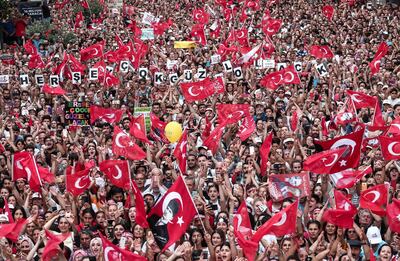
At some point, the AKP and Erdogan woke up to the fact that their candidate was trailing behind Mr Imamoglu. Mr Erdogan then chose to nationalise the election by changing its focus from local to national issues, ranging from the Kurds in Syria to his war against Fethullah Gulen, the exiled cleric and former ally, whom Mr Erdogan blames for instigating the failed coup attempt of June 2016.
The president campaigned tirelessly, appearing in multiple campaign rallies on the same day, effectively transforming the Istanbul election from a local contest to one about himself. This was a dangerous gamble – and possibly a cardinal mistake. At a time of increasing economic distress, he also alienated Kurdish voters with his hostile rhetoric against them.
On election night, Mr Erdogan and the AKP appeared to be seeking ways to manipulate the results; suddenly the Anatolian Agency, the state news agency which had been reporting the tallies, district by district, went silent. Many feared a repeat of the 2017 constitutional referendum, when last-minute chicanery by the AKP ensured its success, significantly increasing Mr Erdogan’s powers and effectively transforming Turkey into a presidential republic. This time, however, the AKP decided to challenge the results and developed a narrative that the opposition had “stolen” the elections, an impossible feat given the complete and absolute control Mr Erdogan has established over all state institutions.
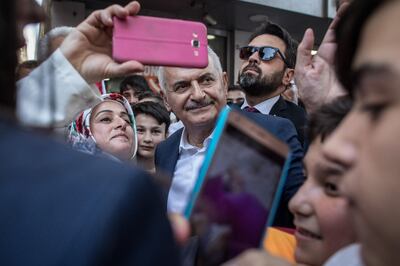
In fact, in a saga that played itself out over a number of days, the AKP forced the Supreme Electoral Council to annul the election results on very questionable grounds – although only the election for the mayor of the metropolitan city was annulled while the Istanbul district elections where the AKP had done well were not.
Mr Erdogan clearly concluded that repeating the mayoral elections was a risk worth taking. He has tried to curry favour for the AKP and his candidate, notably by making overtures towards the imprisoned leader of the Kurdistan Workers’ Party, Abdullah Ocalan. Mr Erdogan allowed Ocalan to see his lawyers for the first time in eight years in the hope that doing so would swing the Kurdish vote. The AKP has also attempted to mobilise the 1.7 million registered voters who did not cast ballots last time to come to the polls.
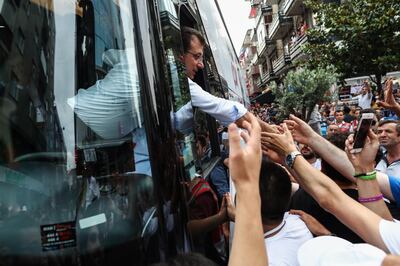
Indications are that the AKP's efforts will come up short. Mr Imamoglu is ahead in the polls and might have even increased his lead because many city denizens, including AKP supporters, have been dismayed by the deceitful way the original election results were overturned. If, indeed, Mr Imamoglu has augmented his margin over Mr Yildirim, it will be difficult for the AKP to throw the result, especially in an atmosphere of heightened vigilance from the opposition and civil society groups.
Will Mr Erdogan accept defeat quietly? He is comfortably ensconced in power as he and his party will not have to face the electorate for another four years. Yet the disquiet about a potential loss is quite visible. A loss in Istanbul represents a severe chink in his armour as it catapults Mr Imamoglu into pole position as his main rival further along the road. As the veteran journalist Kadri Gursel wrote, Mr Erdogan has signalled that he will marshal state resources to undermine and even remove Mr Imamoglu from power. That process has already begun in Ankara, where state prosecutors have launched lawsuits against the winner, Mansur Yavas, who broke the AKP hold on the capital city. They are claiming he was involved in malfeasance during his time as a lawyer in an apparent attempt to remove him from office.
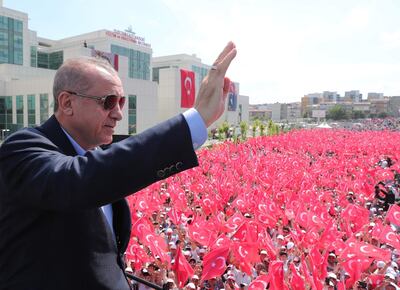
Mr Erdogan’s behaviour bodes poorly for Turkey. He is not just a sore loser, unwilling to accept electoral losses, but rather, someone who has come to view himself as the embodiment of the state or, more simply, suffers from a case of “l’état, c’est moi” syndrome. In an era of rising populist authoritarianism, Mr Erdogan is very much at home. His inclination to undo electoral results is because, institutionally or politically, there are no longer any restraints on him. The brutal crackdown on journalists, academics, opposition political leaders, civil society personalities and ordinary individuals, combined with an arch nationalist and polarising discourse that takes no prisoners, can only do harm to Turkey and undermine economic advances achieved during the first decade of his rule.
Ultimately, the choice is Mr Erdogan’s: he can accept the loss of Istanbul and use it to engage in a new dialogue, especially at a time when Turkey is confronted by a potentially severe economic crisis and downturn that will test everyone’s resolve. Alternatively, he can continue to pursue the current course that delegitimises all political activity other than his own, in which case the June 23 elections will be remembered as a turning point in modern Turkish history – perhaps as significant as the 1960 military coup that overthrew the first democratically elected government.
Henri Barkey is a professor of international relations at Lehigh University and a senior fellow for Middle East studies at the Council on Foreign Relations
